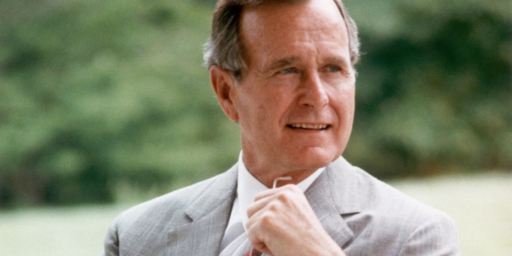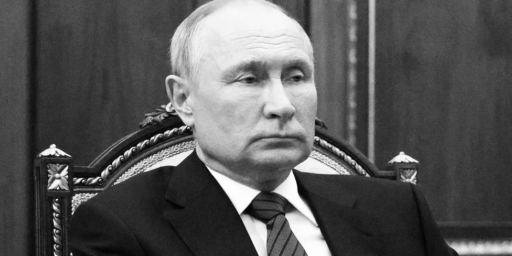THE CLINTON FORMULA
Michael Tomasky interviews Bill Clinton in the current TAP. Clinton displays shrewd analytical skills in terms of how the system works, as well as a rather interesting revisionist view of history.
On why the Democrats lost in 2002:
I just think a lot of people were just unsure how to proceed after 9-11, and they were somewhat intimidated by the president’s big poll numbers. But we always do that in a wartime when we feel threatened. But you know, Max Cleland, the idea that his patriotism could be questioned after he left three limbs in Vietnam, and questioned by a man who had a deferment like I did … you know, it’s just unbelievable to me. [Then] the Bush people took a compromise on the public-employee issue as soon as the election was over. It was just a scam. One of the great scams of modern American history, the way they did that homeland-security bill.
But we shouldn’t whine about that. Their job is to beat us. Our job is to beat them. If they come at us with a deal we think is a scam, we ought to be smart enough to expose it. So I’m not mad at them. That’s their job.
While I’d disagree with some of the first paragraph, notably the continued mischaracterization of what was said about Max Cleland, the second paragraph is quite revealing. Clinton played this game quite successfully himself and at least has the good grace not to whine about it. Too much.
On the schisms within the Democratic party:
First of all, I think the differences in most cases are overrated. And I’d like to give some examples. When I was president and we did welfare reform, I vetoed the first two bills because they eliminated the guarantee of nutrition, food stamps and health care to poor children. I signed the third bill even though it had restrictions I didn’t like on immigrants because I thought that this was a historic opportunity to get a bill that emphasized work over welfare and dependence without hurting poor kids. Now, when I did that we had over two-thirds of the House members and about three-quarters of the Senate voting for it. So we were sort of together.
If you listen to the debate now among the candidates, to take another issue, on fiscal responsibility, there isn’t that much difference between the liberals and the conservatives.***
If there are differences, there’s a better way to get them out than having our candidates dump on each other. I have no objection in this primary season [to] Candidate X saying, “I’m for that,” and Candidate Y saying, “I’m against it.” You’ve got to have a little of that. But I don’t believe that either side should be saying, “I’m a real Democrat and the other one’s not,” or, “I’m a winning Democrat and the other one’s not.”
It oversimplifies the issue. The public is operationally progressive and rhetorically conservative. The more they believe that you’re careful with tax money and responsible in the way you run the programs and require responsibility from citizens, the more the public in general is willing to be liberal in the expenditure of tax money. The more the public believes the Democrats can be trusted with the national security of America, to protect and defend the country against terror and weapons of mass destruction, the more free they are emotionally to think about the other issues.Therefore I think it is highly counterproductive to spend a great deal of time trying to identify the wings of the party and [having] each wing criticize the other. I think it’s fine to explore specific differences among the candidates. We can’t win if people think we’re too liberal. But we can’t get our own folks out if people think we have no convictions. So the trick is to get them both.
A hell of a trick, though.
On defusing the Democrats’ natural disadvantage on security issues:
So what we have to say is, “You can trust us with the national security. If America has to fight, we ain’t gonna lose, because we’ve got the only military in the world. And they won in Afghanistan and Iraq with the training programs and the weapons systems developed during the Clinton years. So what you need a good president for is not to win a war. It’s for when you don’t fight, for a good diplomacy and a good domestic policy. And we don’t agree with the diplomacy or the domestic policy.”
This is just laughable, although Clinton himself could likely have pulled it off. Rather obviously, we don’t have the only military. Presumably, what he’s arguing there is that our military is so dominant, lacking as we do a peer competitor, that we can win any war we’re likely to fight even if Al Sharpton gets elected president.
While the Republicans have gotten away with claiming Clinton destroyed the military when he merely nibbled away at its edges, it’s quite a stretch for Clinton to argue that systems that were put in place in the 1980s were his creation! He presided over a downsizing of the force, the outlines of which were initiated under the previous President Bush, that was quite reasonable given the collapse of the Soviet Union. But I can’t think of any significant new military system that was initiated during his eight years.
And Clinton’s diplomacy didn’t seem to keep us out of too many conflicts during his eight years. The only plausible one we passed on was Rwanda, which he constantly laments not having intervened in now.





